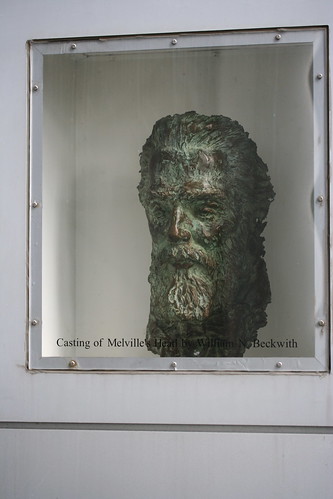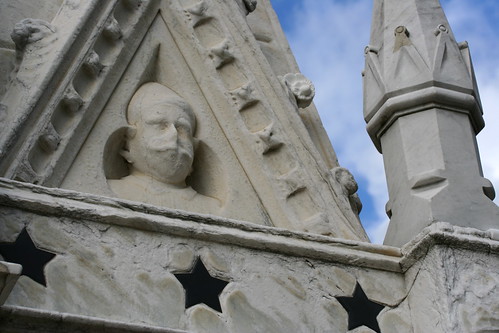Wednesday, March 15, 2006
"At present I would prefer not to be a little reasonable"
"What miserable friendlessness and loneliness are here revealed! His poverty is great; but his solitude, how horrible! Think of it. Of a Sunday, Wall-street is deserted as Petra; and every night of every day it is an emptiness. This building too, which of week-days hums with industry and life, at nightfall echoes with sheer vacancy, and all through Sunday is forlorn. And here Bartleby makes his home; sole spectator of a solitude which he has seen all populous—a sort of innocent and transformed Marius brooding among the ruins of Carthage!" - Bartleby, the Scrivener: A Story of Wall-street
By the time Melville wrote Bartleby -- the story of the scrivener whose passive resistance so aggravates the narrator -- at least two qualities of the financial district were already evident. The dual nature of the neighborhood was well established: a buzzing hive by day, a desert at night and on Sundays. And resistance to Wall Street, passive or otherwise, was clearly useless.
Melville's birthplace at 6 Pearl Street is perhaps an example of this. The modest house is long gone, and the only trace of Melville's presence is a plaque and a bust of the author hidden behind plexiglass in a sconce at the base of towering white office building.
Tuesday, March 14, 2006
stars
I am alone; I am alone! she cried, by the fountain in Regent’s Park (staring at the Indian and his cross), as perhaps at midnight, when all boundaries are lost, the country reverts to its ancient shape, as the Romans saw it, lying cloudy, when they landed, and the hills had no names and rivers wound they knew not where—such was her darkness; when suddenly, as if a shelf were shot forth and she stood on it, she said how she was his wife, married years ago in Milan, his wife, and would never, never tell that he was mad! Turning, the shelf fell; down, down she dropped.-- Mrs. Dalloway by Virginia Woolf
And as the moon rose higher the inessential houses began to melt away until gradually I became aware of the old island here that flowered once for Dutch sailors' eyes - a fresh, green breast of the new world. Its vanished trees, the trees that had made way for Gatsby's house, had once pandered in whispers to the last and greatest of all human dreams; for a transitory enchanted moment man must have held his breath in the presence of this continent, compelled into an aesthetic contemplation he neither understood nor desired, face to face for the last time in history with something commensurate to his capacity for wonder.The Great Gatsby by F. Scott Fitzgerald
It's not a moment as easily acheivable now as it was in 1925 when both these books were published -- at night Regents Park, Long Island and everywhere else remotely urban is lit up with shops, houses, streetlights like territorial markers for human civilisation. Harder to be lost, harder to imagine something commensurate to your capacity for wonder.
Thursday, March 09, 2006
It would not be wonderful to meet a Megalosaurus.
LONDON. Michaelmas Term lately over, and the Lord Chancellor sitting in Lincoln’s Inn Hall. Implacable November weather. As much mud in the streets as if the waters had but newly retired from the face of the earth, and it would not be wonderful to meet a Megalosaurus, forty feet long or so, waddling like an elephantine lizard up Holborn Hill. Smoke lowering down from chimney-pots, making a soft black drizzle, with flakes of soot in it as big as full-grown snow-flakes — gone into mourning, one might imagine, for the death of the sun. Dogs, undistinguishable in mire. Horses, scarcely better; splashed to their very blinkers. Foot passengers, jostling one another’s umbrellas in a general infection of ill-temper, and losing their foot-hold at street-corners, where tens of thousands of other foot passengers have been slipping and sliding since the day broke (if the day ever broke), adding new deposits to the crust upon crust of mud, sticking at those points tenaciously to the pavement, and accumulating at compound interest--Bleak House by Charles Dickens
Friday, March 03, 2006
Oliver's approach to London








As John Dawkins objected to their entering London before nightfall, it was nearly eleven o'clock when they reached the turnpike at Islington. They crossed from the Angel into St. John's Road; struck down the small street which terminates at Sadler's Wells Theatre; through Exmouth Street and Coppice Row; down the little court by the side of the workhouse; across the classic ground which once bore the name of Hockley-in-the-Hole; thence into little Saffron Hill; and so into Saffron Hill the Great: along which the Dodger scudded at a rapid pace, directing Oliver to follow close at his heels. Although Oliver had enough to occupy his attention in keeping sight of his leader, he could not help bestowing a few hasty glances on either side of the way, as he passed along. A dirtier or more wretched place he had never seen. The street was very narrow and muddy, and the air was impregnated with filthy odours. There were a good many small shops; but the only stock in trade appeared to be heaps of children, who, even at that time of night, were crawling in and out at the doors, or screaming from the inside. The sole places that seemed to prosper amid the general blight of the place, were the public-houses; and in them, the lowest orders of Irish were wrangling with might and main. Covered ways and yards, which here and there diverged from the main street, disclosed little knots of houses, where drunken men and women were positively wallowing in filth; and from several of the door-ways, great ill-looking fellows were cautiously emerging, bound, to all appearance, on no very well-disposed or harmless errands.









